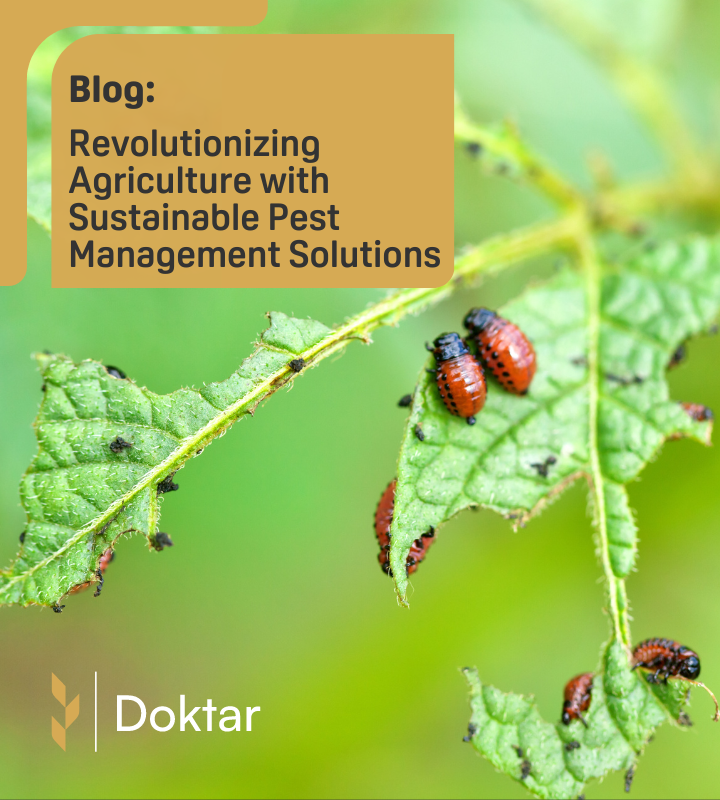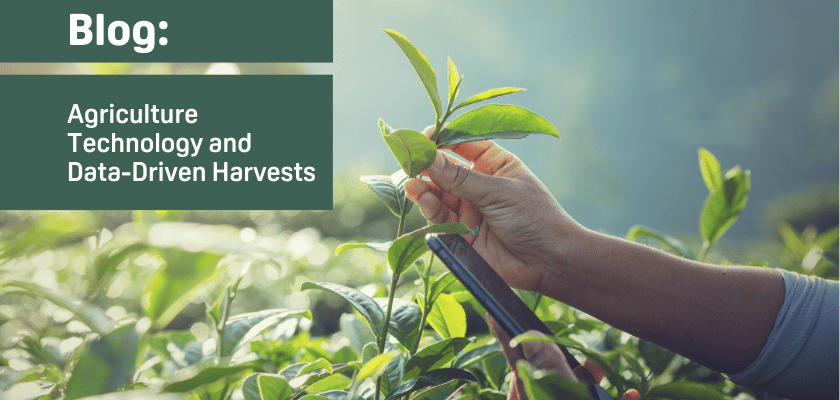

Revolutionizing Agriculture with Sustainable Pest Management Solutions
Using biological control, habitat manipulation, and resistant crop varieties, sustainable pest management minimizes environmental and health impacts. Effective pest management enhances crop yield, meets international standards, prevents export bans, and boosts farmer profitability. Technologies like Doktar's PestTrap and CropMap provide real-time monitoring and actionable insights, ensuring high-quality produce and economic sustainability.
Published on 06 August 2024
Sustainable pest management is a holistic approach to controlling pest populations in agricultural settings while minimizing environmental impact, human health, and non-target organisms. This method focuses on the long-term prevention and control of pests through biological control, habitat manipulation, cultural modification, and resistant varieties. Sustainable pest management aims to create an ecological balance that reduces the reliance on chemical pesticides and promotes the health and productivity of agricultural systems.
Key Principles of Sustainable Pest Management
Integrated Pest Management (IPM) combines various pest control methods and practices to manage pest populations at acceptable levels. IPM emphasizes using biological control agents, such as natural predators and parasites and incorporates cultural practices like crop rotation and intercropping to disrupt pest life cycles. Biological control utilizes natural enemies of pests, such as predators, parasitoids, and pathogens, to keep pest populations in check. This method is environmentally friendly and sustainable, reducing the need for chemical interventions.
Cultural practices involve modifying farming methods to make the environment less conducive to pests. Techniques such as crop rotation, altering planting times, and using cover crops help suppress weed growth and reduce pest habitats. Mechanical and physical controls employ physical barriers, traps, and manual removal to reduce pest numbers. Techniques like tillage can destroy pest habitats and disrupt their life cycles. When necessary, chemical control uses eco-friendly pest control products with minimal impact on the environment and non-target organisms. This approach prioritizes pesticides derived from natural sources and those with low toxicity levels.
Why Eco-Friendly Pest Control is Important in Agriculture
Eco-friendly pest control is crucial for several reasons. Firstly, it protects the environment by reducing the reliance on chemical pesticides, which helps preserve soil health, water quality, and biodiversity. Excessive amounts of chemical pesticides can harm non-target organisms, including beneficial insects, wildlife, and aquatic life. Secondly, it promotes human health by limiting exposure to harmful chemicals for farmers, farmworkers, and consumers, contributing to safer food production and healthier communities.
Economically, sustainable pest management practices can save costs by reducing the need for expensive chemical inputs and minimizing crop losses due to pest damage. They also support the long-term viability of agricultural systems by maintaining soil health and fertility. Moreover, eco-friendly pest control aligns with the principles of regenerative agriculture, which aims to restore and enhance the health of farming ecosystems. This approach promotes practices that improve soil health, increase biodiversity, and sequester carbon, contributing to climate change mitigation.
How Pests Negatively Impact Crop Yield and Quality
Pests can severely impact crop yield and quality. They cause direct damage by feeding on crops, leading to physical damage that can reduce yield and marketability. Many pests are vectors for plant pathogens, spreading diseases that can devastate crops and further reduce yields. Pests can also promote the growth of weeds by disturbing soil and creating favorable conditions for weed seeds to germinate. Additionally, pests can continue to damage crops after harvest, leading to significant losses during storage and transport.
Significance of Pest Management for Export and Revenue Generation
Effective pest management is crucial for ensuring high-quality produce that meets the stringent standards of international markets. Pests can cause blemishes and physical damage to crops, making them less attractive to buyers and reducing marketability. Furthermore, many countries have strict phytosanitary regulations to prevent the importation of pests and diseases. Failure to meet these standards can result in export bans, financial losses, and damage to a country's agricultural reputation.
Implementing robust pest management strategies helps maintain crop quality and yield, thereby ensuring a steady supply of high-grade produce suitable for export. This not only enhances farmers' profitability but also strengthens the agricultural sector's contribution to the economy. For instance, pest-free crops can command higher prices in international markets, thus increasing revenue for farmers and exporters. Additionally, maintaining pest-free status can open up new markets and opportunities for export, further boosting economic gains.
Effective pest management also minimizes post-harvest losses, ensuring that more of the harvested crop reaches the market in good condition. This is particularly important for perishable crops, where quality can deteriorate rapidly due to pest damage. By reducing losses during storage and transport, pest management contributes to higher overall profitability and ensures that farmers receive maximum returns for their produce.
Integrating advanced pest management solutions, such as Doktar's PestTrap and other IoT devices, can significantly enhance crop protection. These technologies provide real-time monitoring and early detection of pest infestations, enabling timely and precise interventions that reduce crop losses and improve yield quality. This supports farmers in achieving better yields and ensures that their produce meets the high standards required for export markets, thereby enhancing their economic sustainability.
Highlighting Doktar’s Services and Products
At Doktar, we are committed to revolutionizing agriculture through innovative, sustainable pest management solutions. Our suite of products and services leverages cutting-edge technology to provide farmers with the tools they need to manage pests effectively while promoting ecological balance and sustainability.
PestTrap: Advanced Pest Detection and Management
PestTrap is a digital pest-tracking station that uses machine learning to identify and count pests in real time. Farmers receive timely alerts when pest levels reach risk thresholds by capturing daily images of pest populations and tracking them through our IoTrack app. This proactive approach enables timely and effective interventions, reducing the economic impact of pest-related crop damage.
Filiz: Comprehensive Crop Management
Filiz is an IoT sensor station that monitors soil and weather conditions. It provides tailored recommendations for optimizing irrigation, managing disease and frost risk, and making informed spraying decisions. Filiz's real-time data and alerts ensure that farmers can respond promptly to changing conditions, enhancing crop health and yield.
CropMap: Precision Agriculture and Market Insights
CropMap transforms agricultural data into actionable market insights through field boundary detection, crop type monitoring, and harvest prediction. With up to 98% accuracy and the ability to monitor 17 crop types, CropMap helps farmers and agribusinesses optimize operations, reduce production costs, and increase profits.
Orbit: Satellite-Based Field Scouting
Orbit is a field scouting app that provides real-time crop monitoring through satellite imagery. It enables farmers to detect problematic areas early, receive irrigation advice, and compare yield potential with neighboring fields. Orbit's variable rate application tool allows for precise input application, optimizing resource use and improving yields.
Conclusion
Sustainable pest management is a vital component of modern agriculture, offering numerous benefits for the environment, human health, and farm productivity. By adopting eco-friendly pest control practices and leveraging innovative technologies like those offered by Doktar, farmers can achieve greater sustainability and resilience in their agricultural operations. Together, we can revolutionize agriculture and create a healthier future for all.

Agriculture Technology and Data-Driven Harvests
The convergence of agriculture technology and data-driven solutions represents the next frontier of innovation in farming. With companies like Doktar leading the way, farmers can leverage these advancements to improve productivity, reduce environmental impact, and secure a more sustainable future for agriculture. Whether through precision agriculture, sustainable agriculture, or cutting-edge smart agriculture technology, the future of farming is bright, and data is at the heart of this transformation. Technology's positive impact on this future should inspire and motivate us all.

Integrating Crop Health Monitoring Systems for Better Farm Management
Crop health monitoring systems revolutionize modern agriculture by enabling real-time insights into plant health, reducing losses, and promoting sustainability. Tools like Doktar’s CropMap and Orbit integrate advanced technologies, empowering farmers with data-driven decisions. By enhancing efficiency and sustainability, these systems are essential for future-proofing agricultural operations.

Modern Agriculture: Innovative Solutions to Combat Global Food Insecurity
Modern agriculture combats global food insecurity with precision agriculture, sustainable practices, and biotechnology. Tools like IoT, automation, and crop innovations optimize resource use, enhance resilience, and ensure stable food supplies. By integrating smart technologies, agribusinesses address challenges like climate change and resource scarcity, paving the way for a sustainable food future.
